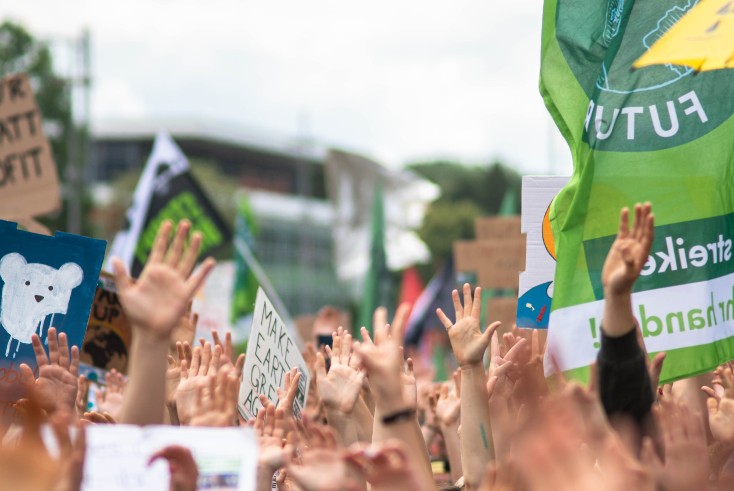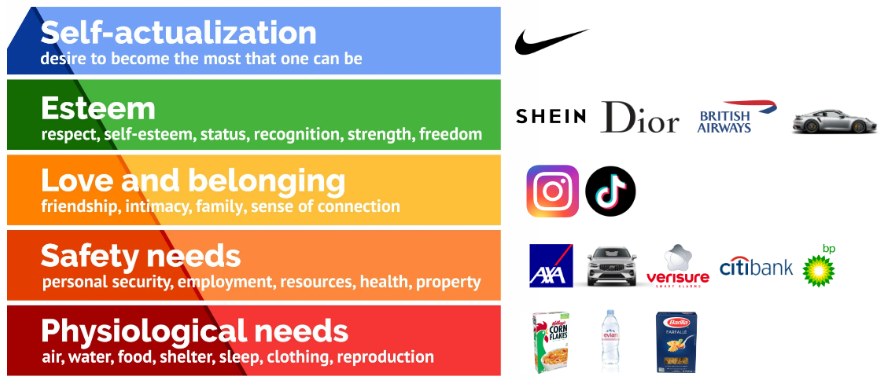See the bigger opportunity: we need more radical sustainable behaviours

Opinion
In the coming years, brands and marketers will have to reshape the influence they are having on our consumerist culture and better connect to the reality of our climate predicament, writes Jellyfish’s VP of sustainability.
Climate issues are sometimes keeping me up at night. Last week, I was wondering for how long it had been a preoccupation of mine and, as my mind wandered, I went back in time — 15 years back — to one of the most decisive and stressful days I have had.
It’s 2008 and I am sitting for an exam that I am sure will determine the rest of my life. The test I’m taking is called “Contemporary Question”. What a programme, right? Although there is no clear syllabus, we’ve been asked to study two key topics:
One revolves around the inspiring and a bit sensitive topic of “Identities” (remember, 9/11 is not far behind, Clash of Civilizations is the new Bible, and Barack Obama is promising that “Yes, we can” have a black president in a country that was built on slavery).
The other one is related to “The Environment” — that’s the one I’d like to focus on today.
I was never really inspired by that topic. In fact, I picked the first one about “The Identities” as it resonated with my background as a descendant of Italian immigrants and spent the morning trying to figure out if “affirming identities necessarily means affirming differences”. Instead, I could have been writing an answer to the following question: “Is a policy of the environment possible?”
I’m 33 now and still do not have a clue what that means.
Or maybe I do.
So let me correct that: I’m 33 now and still do not have a clue what that means. I think this is absurd.
To be more specific, I believe there is a big, harmful mistake in the way this question is framed; a mistake that we’ve kept making over and over again, that we still make today. This mistake conditions our perception and thinking around related issues and impacts our ability to take action. This mistake lies in the very word we used to communicate around this topic: “The environment”.
We keep placing ourselves at the centre
The English term derives from the word “environnement” in French that itself came from the latin word “virare” which could be translated as “what revolves around”. Around what? Around us, humans. So when we talk about the environment, we automatically place ourselves at the centre. We do not consider ourselves part of nature, we consider ourselves surrounded by nature. As a result, we get two false ideas:
1. That we are isolated from it.
2. That we have complete control over it.
Is this anthropocentric way of perceiving things surprising? No, it really isn’t. Just remember how outrageous Galileo’s theory was four centuries ago, when he dared to demonstrate that our European civilization was not at the centre of the universe and was censored, forced to deny his own theory, and eventually exiled.
It’s just how our brains are wired: we think of ourselves first and we think of ourselves as disconnected from other life forms. This radical impression of autonomy feeds both our motivation to achieve things that will give value to our lives and a terrible feeling of isolation.
We are egomaniacs and we keep speaking about the environment and all of its semantical friends (the planet, climate, biodiversity…) as if they were completely external to us.
So what? Why would that be such a problem?
Because we do not care about anything external. In the worst case, we consider it a threat and reject the whole idea, in the most common case we allow the subject some attention and intellectual interest, but deep down what really matters to us doesn’t differ from what Abraham Maslow has synthesised in his hierarchy of needs: meeting our physiological needs, ensuring our safety, finding love and a sense of belonging, enhancing our self-esteem and, for the luckiest of us, reaching a state of self-actualisation.
Now, as most of us have grown in the era of consumerism (obviously I’m speaking from a European, financially privileged perspective here), we’ve learnt that fulfilling those needs requires the ownership of many goods and services that brands provide us against a variable amount of money.
Below is a very imperfect illustration of how brands or products relate to those different needs:

Brands have a role to play in reshaping our representation of the world
The comfort, ease and abundance that brands have brought to our lives have participated in reinforcing the illusion that makes us believe we are not part of the natural world; that we would not be directly affected by global warming, or by the depletion of our reserves of fossil fuels, or by the loss of biodiversity; that what’s around us may crash but that we will be sitting in the middle, still able to consume the food and clothes and cars and digital content we like.
Will brands be able to protect us from the rapid transformation of our ecosystems and the collapse of natural resources? They certainly won’t because they are as impacted as we are by those changes.
In 2022, it became almost impossible to find mustard in French supermarkets and, believe me, French people were obsessed with that shortage. I mean, isn’t the Dijon mustard one of the basic ingredients of our gastronomy? Some blamed it on the war in Ukraine when they should have been more interested in what was going on much further West. The drought in Canada was indeed impacting the cultivation of mustard seeds so much that the production was dramatically slowed down.
In 2021, lack of water had already put another industry on hold, this time in Taiwan. As the country experienced its worst drought in 56 years, it had to pause the production of electronics aimed for the automotive industry, thus making it impossible to deliver all the brand new cars consumers were hoping to buy.
So brands won’t be capable of maintaining the exact same offer, nor will they be able to deliver the same narrative. And that’s what I find fascinating.
In the coming years, brands and marketers will have to reshape the influence they are having on our culture and desires to better connect to the reality of our interconnected and interdependent ecosystems.
That could mean systematically valuing the natural resources that participated in the creation and delivery of goods in communication, in pricing models, in distribution channels. That could mean refocusing a significant part of a brand’s business around circular economy.
That probably means dropping some of our current buzzwords (net zero for example) and sustainability associated imagery (forests or polar bears) to rather show that environmental issues are, in fact, human issues.
We are not looking away, but we are keeping our eyes closed
Fifteen years ago, if I had chosen to write about the “Environment” instead of “Identities”, I would have probably started my essay with this famous quote from former French President Jacques Chirac: “Our house is burning and we’re looking away”. Every Sciences Po candidate I had met knew this sentence by heart. It was so famous at the time, so memorable that it had become a true symbol of the legitimacy climate action had gained.
Although I still recognize the power of this sentence today, I no longer think it reflects what’s at stake. Similarly to the word “Environment”, this metaphor does not acknowledge how much our human existences are bound to the fate of the living world. By comparing nature with a house — designed, built and controlled by humans and, let’s be honest, mostly men — and by putting us in a place where we are able to look away (so outside the house where we are not threatened by the flames), it only reinforces the idea that the crisis is external.
Well, no, it’s not. It’s about the living world, of which humans, and the brands they interact with, are part of.
 Céline Craipeau is VP, sustainability at digital marketing company Jellyfish.
Céline Craipeau is VP, sustainability at digital marketing company Jellyfish.




